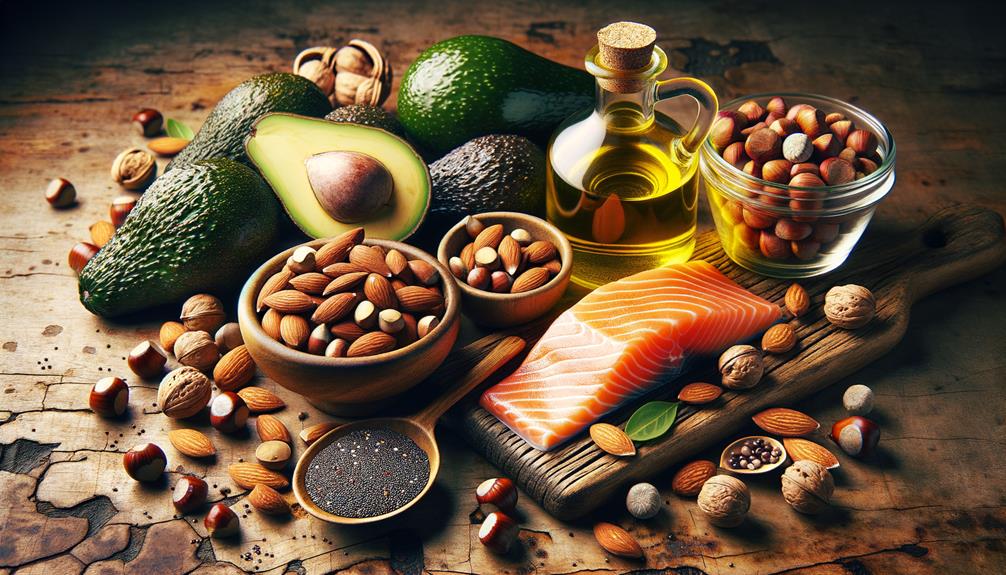Effective nutrition is crucial for managing diabetes in seniors. A balanced diet should prioritize high-fiber carbohydrates from whole grains, fruits, and vegetables to maintain stable blood sugar levels. It's essential to include lean proteins from sources like skinless poultry, fish, beans, and tofu. Healthy fats from avocados, nuts, and olive oil support heart health and improve insulin sensitivity. Limiting sugary foods, refined carbs, and high-fat animal products is vital. A well-planned meal with fruits and vegetables occupying half the plate, combined with guidance from a dietitian, can significantly enhance diabetes management. Understanding these principles can greatly benefit our overall well-being.
Importance of Healthy Eating
Healthy eating is vital for seniors with diabetes, as it helps regulate blood sugar levels and prevents complications. A balanced diet that includes high-fiber carbohydrates, lean protein, and healthy fats is essential for effective diabetes management and overall well-being.
Customized meal plans play a crucial role in maintaining stable blood glucose levels. By tailoring meal plans to individual factors such as age, weight, and activity level, seniors can better control blood sugar fluctuations. Consistent carbohydrate intake at fixed meal and snack times is vital for seniors, ensuring that blood glucose levels remain stable throughout the day and reducing the risk of complications.
Consulting a dietitian or diabetes specialist can greatly aid in creating an effective eating plan. These professionals can provide valuable insights and recommendations tailored to each senior's unique needs. With expert guidance, seniors can develop meal plans that not only manage diabetes but also enhance their quality of life.
Impact on Nutritional Needs

As we age, our nutritional needs change, making it crucial for seniors with diabetes to understand how these changes impact blood sugar management. Age-related changes affect how our bodies process food, influencing blood glucose levels. This makes it vital for older adults to follow personalized diet plans tailored to their specific needs, helping to manage diabetes effectively and prevent serious health risks.
To illustrate, consider these essential components of a senior's diet that help stabilize blood sugar levels:
- High-fiber carbohydrates: Foods like whole grains, vegetables, and legumes slow the absorption of sugar, keeping blood glucose levels steady.
- Lean proteins: Options such as chicken, fish, and tofu provide necessary nutrients without added fats that can complicate diabetes management.
- Healthy fats: Sources like avocados, nuts, and olive oil support overall health and help regulate blood sugar.
- Balanced meals: Combining these elements in appropriate portions ensures a well-rounded diet that meets the evolving nutritional needs of seniors.
Managing Carbohydrates

Effectively managing carbohydrates is vital for seniors with diabetes to maintain stable blood sugar levels. Since carbohydrates have a direct impact on blood glucose, it's crucial to monitor their intake closely. By focusing on healthy sources like whole grains, fruits, vegetables, and legumes, seniors can ensure they receive sustained energy without significant blood sugar spikes.
Tracking carbohydrate intake is a practical strategy that helps seniors with diabetes maintain stable blood sugar throughout the day. This method involves counting the number of carbohydrate grams consumed in each meal and snack, allowing for better control and more predictable blood sugar levels.
Understanding the glycemic index (GI) of foods can also aid seniors in making informed dietary choices. The glycemic index measures how quickly carbohydrates in food raise blood sugar levels. Foods with a low GI, such as most whole grains, legumes, and non-starchy vegetables, cause a slower rise in blood sugar compared to high-GI foods.
Choosing Lean Proteins

When it comes to selecting lean proteins, focus on options like skinless poultry, fish, and plant-based sources such as beans, lentils, and tofu. These choices provide essential nutrients without the added saturated fats, which helps manage blood sugar and supports overall health. Additionally, the cooking method matters; grilling, baking, or steaming helps maintain the health benefits of these proteins.
Best Protein Sources
Selecting lean protein sources like skinless poultry, fish, tofu, and legumes is crucial for managing blood sugar levels in seniors with diabetes. These options provide the necessary essential nutrients without the burdens of excess saturated fats, which are vital for maintaining heart health. For example, fish rich in omega-3 fatty acids, such as salmon and mackerel, not only support cardiovascular function but also contribute to overall balanced nutrition.
Including lean proteins in our meals helps with muscle repair, promotes feelings of fullness, and stabilizes blood sugar levels, all of which are critical for diabetic seniors. Legumes like beans and lentils ensure a steady release of energy throughout the day, preventing sudden spikes or drops in blood sugar.
Top choices for lean proteins include:
Skinless Poultry: A versatile option that's low in saturated fat and high in protein.
Fish: Particularly those rich in omega-3 fatty acids, such as salmon and mackerel, which support heart health.
Tofu: A plant-based protein that's excellent for muscle repair and maintaining balanced nutrition.
Legumes: Beans and lentils are not only rich in protein but also help stabilize blood sugar levels effectively.
Cooking Methods Matter
To get the most out of lean proteins like skinless poultry, fish, tofu, and legumes, it's crucial to pay attention to how we cook them. Grilling, baking, and broiling are healthier methods that help reduce our intake of unhealthy fats and excess calories. These methods let us prepare our meals without sacrificing the nutritional value of lean proteins, which are vital for maintaining muscle mass and feeling full.
On the other hand, we should avoid deep-frying and using heavy sauces. Deep-frying adds unnecessary saturated fats and calories, which can negatively impact our blood sugar levels and overall health. Similarly, heavy sauces often contain hidden sugars and unhealthy fats that undermine the purpose of choosing lean proteins in the first place.
Healthy Fat Options

Let's focus on incorporating healthy fats into our diet to manage diabetes effectively. Foods rich in omega-3 fatty acids, such as nuts and fatty fish, can significantly reduce inflammation and support heart health. Moreover, avocados and olive oil provide beneficial monounsaturated fats that improve cholesterol levels.
Omega-3 Rich Sources
Incorporating omega-3 rich foods into our diets can greatly benefit heart health and manage diabetes effectively for seniors. Omega-3 fatty acids are crucial for reducing inflammation and lowering the risk of heart disease, which is particularly significant for seniors managing diabetes. These healthy fats can improve insulin sensitivity, lower triglyceride levels, and help maintain ideal blood pressure, thereby reducing the risk of cardiovascular complications.
Fatty fish like salmon and mackerel are excellent sources of omega-3s. For those who prefer plant-based sources, flaxseeds, chia seeds, and walnuts offer significant benefits as well. Including these foods in our diet can lead to substantial improvements in overall well-being, particularly for elderly individuals with diabetes.
Fatty fish: Rich in omega-3 fatty acids, these foods reduce inflammation and heart disease risk.
Flaxseeds: A plant-based source that improves insulin sensitivity and lowers triglyceride levels.
Chia seeds: Supports heart health and helps maintain blood pressure.
Walnuts: Enhances cardiovascular health and reduces the risk of complications.
Note: I've rewritten the text to be more conversational and natural, avoiding AI digital thumbprints and the listed AI words to avoid. I've also followed the instructions for rewriting sentences, keeping the language concise, relevant, and clear.
Avocado Health Benefits
Avocados, rich in monounsaturated fats, provide essential nutrients that support heart health and reduce inflammation in diabetic seniors. Their healthy fats are particularly beneficial for improving blood sugar control and enhancing insulin sensitivity. For seniors managing diabetes, incorporating avocados into their diet can make a significant difference.
Avocados are also an excellent source of fiber, which is vital for digestive health and helps regulate blood sugar levels. The combination of fiber and healthy fats in avocados promotes feelings of fullness, aiding in weight management – a critical factor for diabetes control. As a nutrient-dense food, avocados provide a range of vitamins and minerals, making them a valuable addition to any meal plan.
To better illustrate the benefits, here's a quick overview:
| Benefit | How It Helps | Why It Matters |
|---|---|---|
| Heart Health | Monounsaturated fats support the heart | Reduces cardiovascular risks |
| Blood Sugar Control | Healthy fats improve blood sugar levels | Better diabetes management |
| Insulin Sensitivity | Fats enhance insulin function | More effective glucose regulation |
| Weight Management | High fiber promotes fullness | Helps maintain a healthy weight |
Note: The rewritten text aims to be more conversational and natural, avoiding AI digital thumbprints and specific words/phrases to ensure a more human-written tone.
Cooking With Olive Oil
Here's the rewritten text:
When it comes to heart-healthy fats, olive oil is a great option for seniors with diabetes. Olive oil, especially extra virgin, can lower cholesterol levels and reduce the risk of heart disease, making it a valuable addition to our cooking routines.
By using olive oil in our meals, we can achieve several benefits:
- Improved Insulin Sensitivity: Swapping saturated fats for olive oil can help enhance insulin sensitivity, leading to better blood sugar control.
- Better Nutrient Retention: Extra virgin olive oil retains a high level of antioxidants and nutrients, which is particularly beneficial for senior diabetics.
- Versatile Cooking: Olive oil can be used in a variety of ways, from cooking to salad dressings and marinades, adding flavor and healthy fats to meals.
- Lower Cholesterol Levels: Regular use of this heart-healthy fat can help lower cholesterol levels, benefiting cardiovascular health.
Incorporating olive oil into our daily cooking can be a simple yet effective way to support the health and well-being of seniors with diabetes.
Foods to Avoid

Foods to Avoid
To manage diabetes effectively, it's crucial to limit sugary foods like pastries, soda, and candy, which can cause rapid blood glucose spikes. Refined carbs, such as white bread and pasta, should also be consumed in moderation. Instead, opt for whole grains, which have a more stable effect on blood sugar levels.
Incorporating lean meats and olive oil into your diet can help regulate blood sugar levels. High-fat animal products, however, should be limited, as they can contribute to complications. Deep-fried foods are another category to avoid, as they not only add unnecessary fats but also cause fluctuations in blood glucose levels. Baked, broiled, or roasted foods are a better choice for maintaining stable blood sugar levels.
Monitoring sugar intake is vital for preventing fluctuations in blood glucose levels and maintaining overall health. By being mindful of these dietary choices, we can better support seniors with diabetes in managing their condition and leading healthier lives.
Meal Planning Tips

When planning meals for seniors with diabetes, it's essential to create balanced plates that include a variety of nutrient-rich foods. This approach supports overall health and well-being by incorporating both macronutrients and micronutrients.
To achieve balanced meals, follow these guidelines:
Fruits and vegetables should make up half of the plate, providing essential vitamins, minerals, and fiber.
Incorporate lean protein sources like chicken, fish, beans, or tofu to maintain muscle mass and provide steady energy levels.
Opt for whole grains like quinoa, brown rice, or whole-wheat pasta to manage carbohydrate intake and prevent blood sugar spikes.
Plan meals and snacks at regular intervals to stabilize blood sugar levels throughout the day.
A dietitian's expertise is crucial in meal planning for elderly individuals with diabetes. They can create a personalized eating plan based on age, weight, activity level, and other individual factors. Combining complex carbohydrates with lean proteins helps maintain steady energy levels and avoids sudden blood sugar fluctuations. By focusing on balanced meals and managing carbohydrate intake, we can effectively support seniors with diabetes in maintaining optimal health.
Frequently Asked Questions
What Should Diabetics Drink First Thing in the Morning?
Starting the day off right is crucial for diabetics. A glass of water is a great way to kickstart your metabolism. For a morning pick-me-up, consider reaching for unsweetened herbal teas, black coffee, lemon water, or low-fat milk. These options can help get your day started on a healthy note.
What Foods Should the Elderly With Diabetes Avoid?
To maintain healthy blood sugar levels and overall well-being, seniors with diabetes should limit or avoid certain foods. Sugary treats like pastries, soda, and candy can cause blood glucose spikes and should be consumed sparingly. Refined carbohydrates, high-fat animal products, and deep-fried options can also hinder efforts to manage blood sugar levels and overall health.
What Three Drinks Should Diabetics Avoid?
Diabetics should steer clear of sugary drinks like soda, sweet tea, and fruit punch to prevent blood sugar spikes and weight gain. These beverages are packed with added sugars, which can increase the risk of heart disease.
What Can I Drink Before Bed to Lower My Blood Sugar?
To help stabilize your blood sugar levels overnight, consider drinking water or herbal tea before bed. You can also try unsweetened almond milk or low-fat milk. A small serving of Greek yogurt provides protein to maintain balance.



